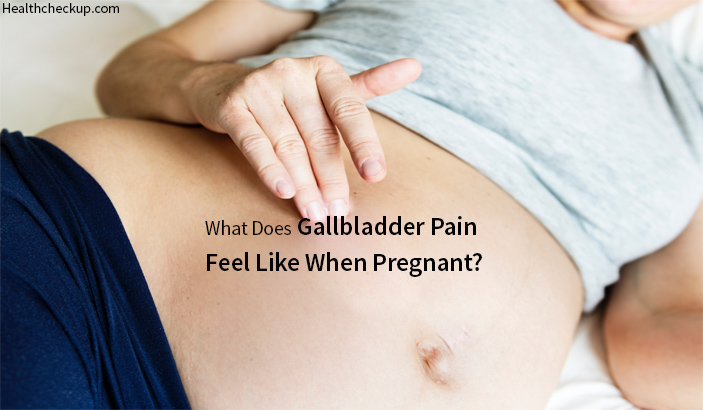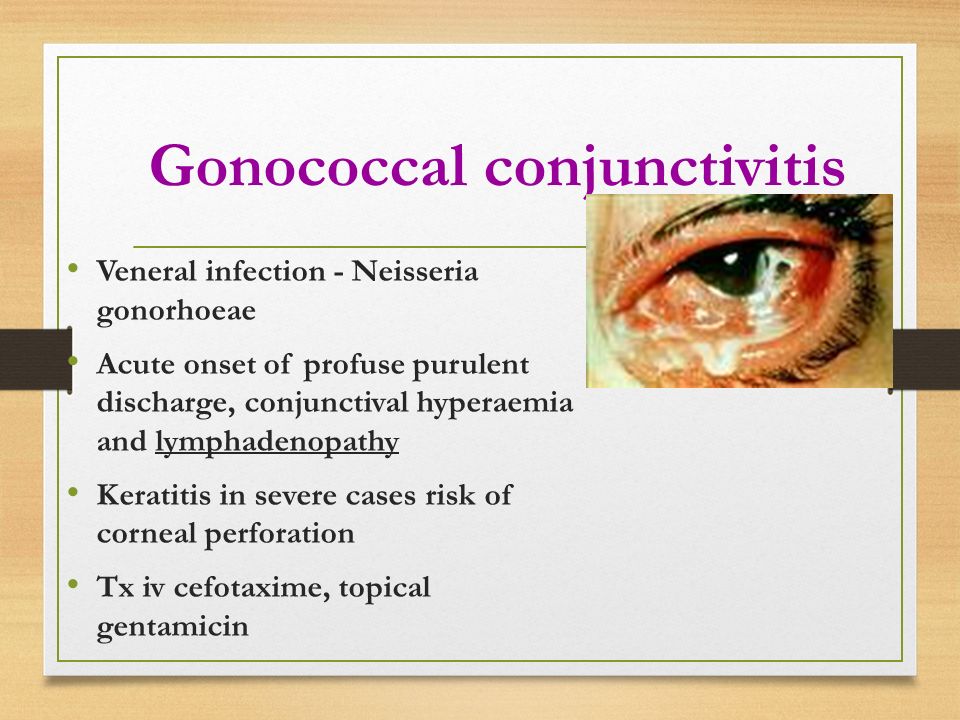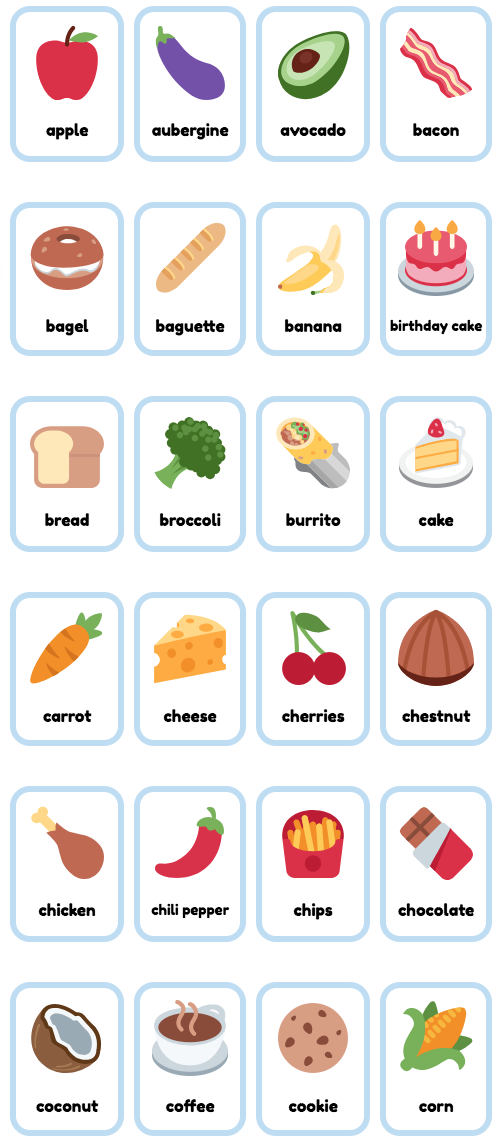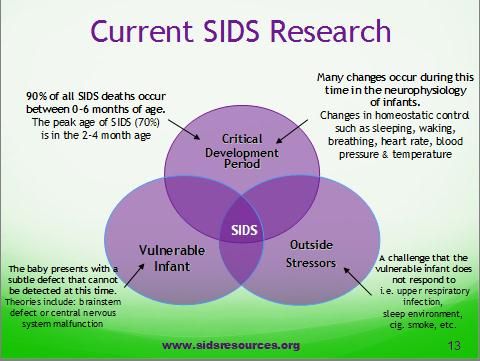Bad indigestion during pregnancy
Indigestion and heartburn in pregnancy
Indigestion, also called heartburn or acid reflux, is common in pregnancy. It can be caused by hormonal changes and the growing baby pressing against your stomach.
You can help ease indigestion and heartburn by making changes to your diet and lifestyle, and there are medicines that are safe to take in pregnancy.
Symptoms of indigestion and heartburn
Symptoms of indigestion and heartburn include:
- a burning sensation or pain in the chest
- feeling full, heavy or bloated
- burping or belching
- feeling or being sick
- bringing up food
Symptoms usually come on soon after eating or drinking, but there can sometimes be a delay between eating and developing indigestion.
You can get symptoms at any point during your pregnancy, but they are more common from 27 weeks onwards.
Things you can do to help with indigestion and heartburn
Changes to your diet and lifestyle may be enough to control your symptoms, particularly if they are mild.
Eat healthily
You're more likely to get indigestion if you're very full.
If you're pregnant, it may be tempting to eat more than you would normally, but this may not be good for you or your baby.
Find out more about a healthy diet in pregnancy and foods to avoid.
Change your eating and drinking habits
You may be able to control your indigestion with changes to your eating habits.
It can help to eat small meals often, rather than larger meals 3 times a day, and to not eat within 3 hours of going to bed at night.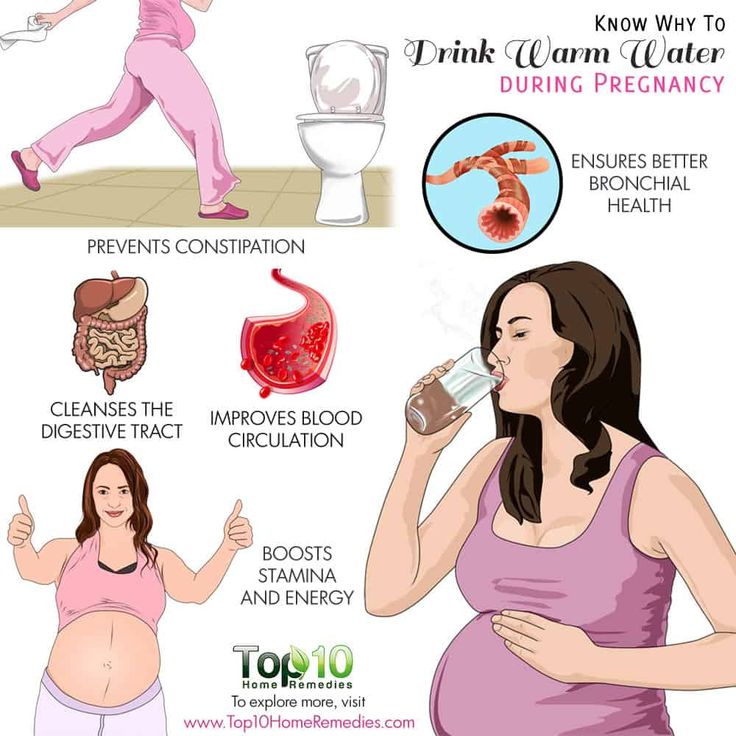
Cutting down on drinks containing caffeine, and foods that are rich, spicy or fatty, can also ease symptoms.
Keep upright
Sit up straight when you eat. This will take the pressure off your stomach. Propping your head and shoulders up when you go to bed can stop stomach acid coming up while you sleep.
Stop smoking
Smoking when pregnant can cause indigestion, and can seriously affect the health of you and your unborn baby.
When you smoke, the chemicals you inhale can contribute to your indigestion. These chemicals can cause the ring of muscle at the lower end of your gullet to relax, which allows stomach acid to come back up more easily. This is known as acid reflux.
Smoking also increases the risk of:
- your baby being born prematurely (before week 37 of your pregnancy)
- your baby being born with a low birthweight
- sudden infant death syndrome (SIDS), or "cot death"
There's lots of help available to stop smoking.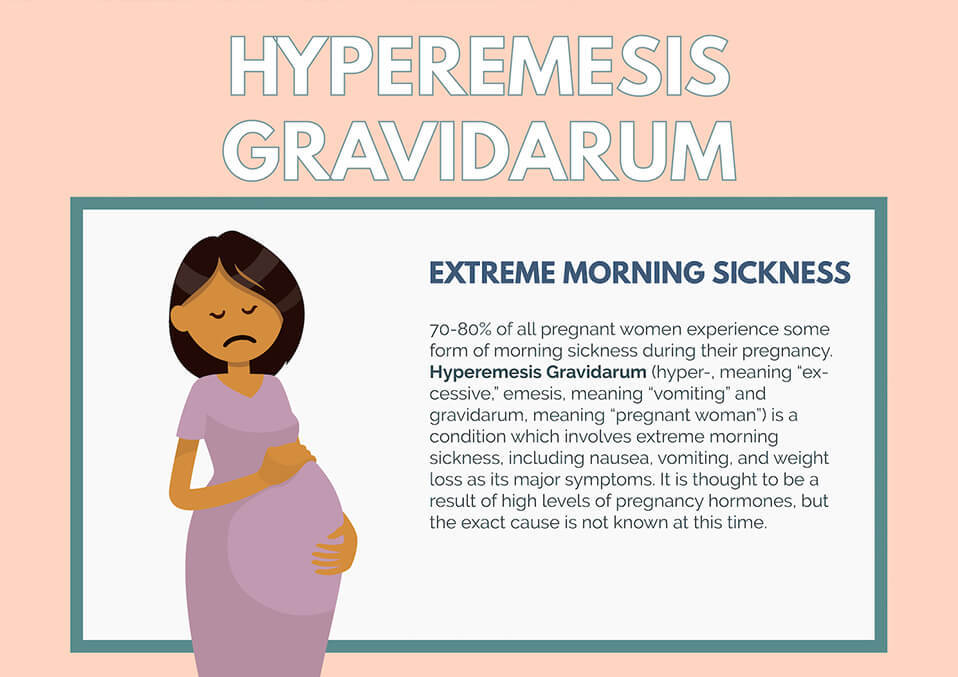 Talk to your midwife or call the NHS Smokefree helpline on 0300 123 1044. Find out more about stopping smoking in pregnancy.
Talk to your midwife or call the NHS Smokefree helpline on 0300 123 1044. Find out more about stopping smoking in pregnancy.
Avoid alcohol
Drinking alcohol can cause indigestion. During pregnancy, it can also lead to long-term harm to the baby. It's safest to not drink alcohol at all in pregnancy.
Find out more about alcohol and pregnancy
When to get medical help
See your midwife or GP if you need help managing your symptoms or if changes to your diet and lifestyle do not work. They may recommend medicine to ease your symptoms.
You should also see your midwife or GP if you have any of the following:
- difficulty eating or keeping food down
- weight loss
- stomach pains
Your midwife or GP may ask about your symptoms and examine you by pressing gently on different areas of your chest and stomach to see whether it's painful.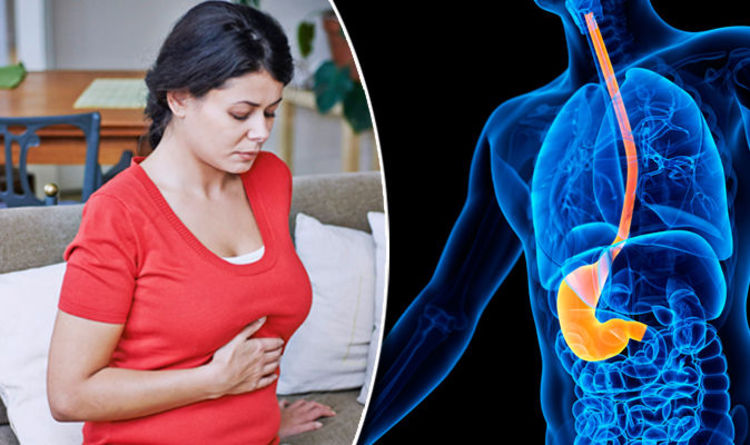
If you're taking prescription medicines
Speak to your GP if you're taking medicine for another condition, such as antidepressants, and you think it may be making your indigestion worse. They may be able to prescribe an alternative medicine.
Never stop taking a prescribed medicine unless you're advised to do so by your GP or another qualified healthcare professional who's responsible for your care.
Medicines for indigestion and heartburn
Medicines for indigestion and heartburn during pregnancy include:
- antacids – to neutralise the acid in your stomach (some are available over the counter from a pharmacist)
- alginates – to relieve indigestion caused by acid reflux by stopping the acid in your stomach coming back up your gullet
You may only need to take antacids and alginates when you start getting symptoms. However, your GP may recommend taking them before symptoms come on – for example, before a meal or before bed.
However, your GP may recommend taking them before symptoms come on – for example, before a meal or before bed.
If you're taking iron supplements as well as antacids, do not take them at the same time. Antacids can stop iron from being absorbed by your body.
If antacids and alginates do not improve your symptoms, your GP may prescribe a medicine to reduce the amount of acid in your stomach. 2 that are widely used in pregnancy and not known to be harmful to an unborn baby are:
- ranitidine – a tablet you take twice a day
- omeprazole – a tablet you take once a day
Causes of indigestion in pregnancy
Symptoms of indigestion come when the acid in your stomach irritates your stomach lining or your gullet. This causes pain and a burning feeling.
When you're pregnant, you're more likely to have indigestion because of:
- hormonal changes
- the growing baby pressing on your stomach
- the muscles between your stomach and gullet relaxing, allowing stomach acid to come back up
You may be more likely to get indigestion in pregnancy if:
- you had indigestion before you were pregnant
- you've been pregnant before
- you're in the later stages of pregnancy
Video: Eating well on a budget
In this video, a dietitian gives advice on how to eat healthily on a budget.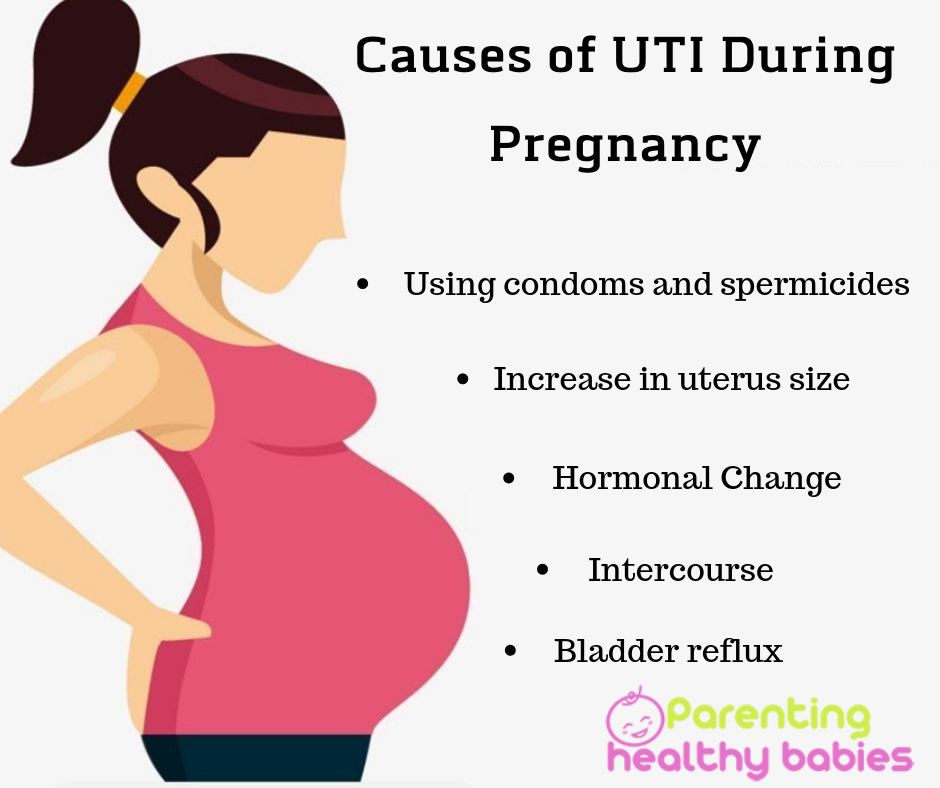
Media last reviewed: 13 January 2021
Media review due: 13 January 2024
Indigestion and heartburn in pregnancy
Indigestion and heartburn in pregnancy | Pregnancy Birth and Baby beginning of content6-minute read
Listen
Key facts
- Indigestion (dyspepsia) is a feeling of pain or discomfort in your stomach, while heartburn is a burning pain in your stomach and chest caused by stomach acid.
- Heartburn is very common in pregnancy because of hormonal changes and your uterus pressing up against your stomach as your baby grows.
- Heartburn is often triggered by fatty or spicy foods, caffeine, chocolate or citrus fruit juice.
- You can try to avoid heartburn by eating small meals more often, eating slowly, not lying down or exercising after meals and sleeping on several pillows.
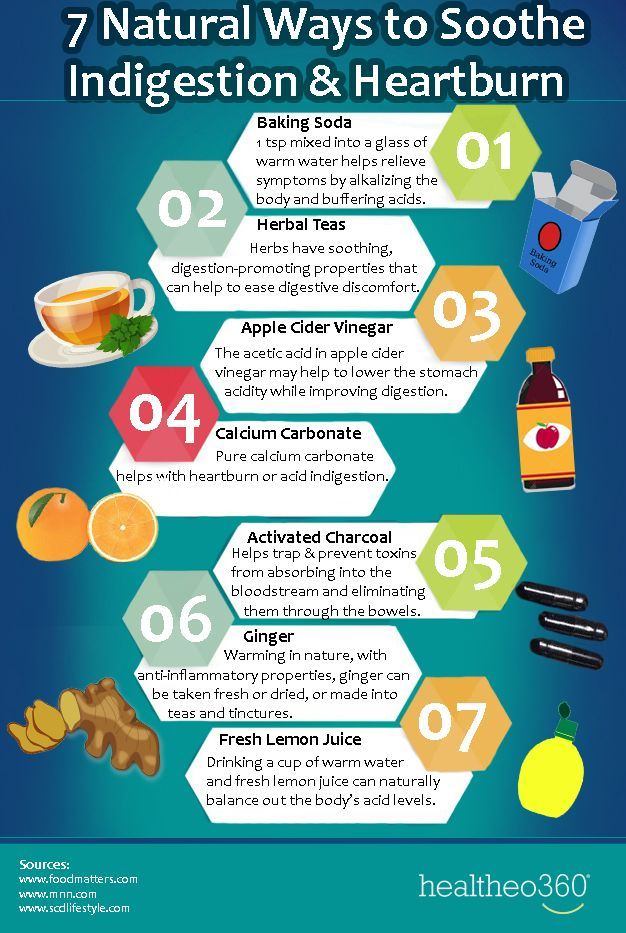
- There are medicines you can use to control indigestion and heartburn, so see your doctor if your symptoms don’t settle down on their own.
What are indigestion and heartburn?
Indigestion and heartburn are symptoms that are very common in pregnancy. If you’re pregnant, you have an 8 in 10 chance you will experience these symptoms at some point in your pregnancy.
Indigestion, also called 'dyspepsia', is a feeling of pain or discomfort in your stomach . This mostly occurs after eating or drinking.
Heartburn, also known as reflux, is a burning pain in your stomach or chest going up towards your throat. It’s caused by stomach acid coming up your oesophagus (the tube that connects your mouth to your stomach). The acid irritates the lining of your oesophagus.
Sometimes food might come back up from your stomach into your mouth. You might also notice a bitter taste in your mouth.
Why might I get heartburn when I’m pregnant?
Heartburn may be caused by changes in your hormone levels. One of the pregnancy hormones, called progesterone, can relax the muscle that usually holds your oesophagus closed where it meets your stomach. This allows food and acid from your stomach to go back up your oesophagus.
One of the pregnancy hormones, called progesterone, can relax the muscle that usually holds your oesophagus closed where it meets your stomach. This allows food and acid from your stomach to go back up your oesophagus.
Heartburn becomes more common as your pregnancy progresses. This can happen when your uterus (womb) pushes up against your stomach as your baby grows. This also pushes the contents of your stomach up into your oesophagus.
You’re more likely to get heartburn during pregnancy if you’ve had a baby before or if you get heartburn when you’re not pregnant.
What kinds of things will give me heartburn?
Heartburn can be triggered by what you eat and drink, such as:
- a big meal
- high-fat foods
- spicy foods
- chocolate
- citrus fruit juices
- drinks containing caffeine, including coffee, tea and cola
- alcohol (which is not recommended in pregnancy)
Other things that may trigger heartburn include:
- doing exercise soon after eating
- lying down after eating
- feeling anxious
Because everyone is different, it's a good idea to take note of the particular foods, drinks or activities that give you heartburn while you are pregnant.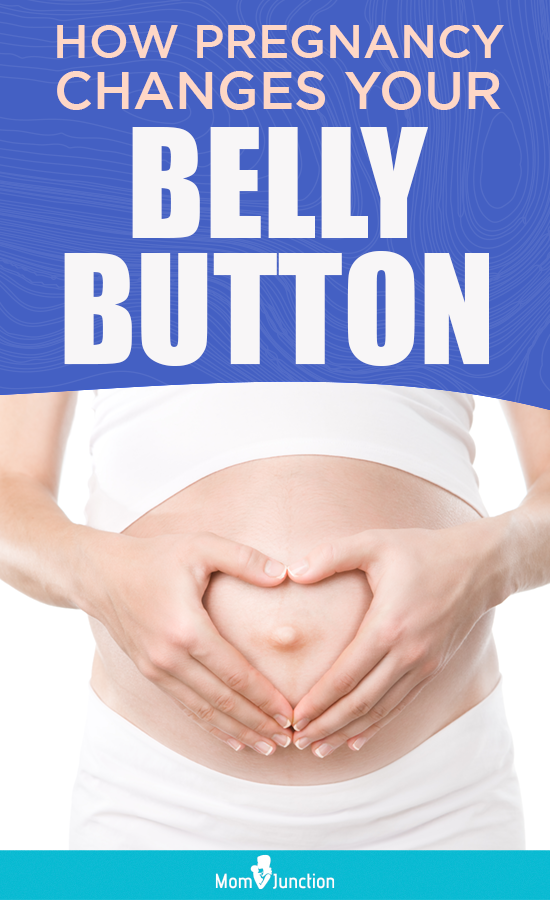
Can heartburn hurt my baby?
Heartburn usually won’t cause any problems for your baby, but it’s uncomfortable for you.
A healthy diet is important for both your and your baby’s health. If heartburn is making it hard to eat healthy food, it’s best to treat it.
How can I avoid getting heartburn?
If your symptoms are mild, changing how you eat may help prevent heartburn. You could try:
- eating smaller meals more often and eating slowly
- avoiding eating for 2 or 3 hours before exercise or going to bed
- avoiding foods and drinks that give you heartburn
- avoiding eating and drinking at the same time, which can make your stomach more full
- sitting up straight while eating and not lying down after a meal
- raising the head of your bed or sleeping on at least 2 pillows
- sleeping on your left side
You might find it helpful to chew gum, which makes you produce more saliva to help neutralise the acid from your stomach.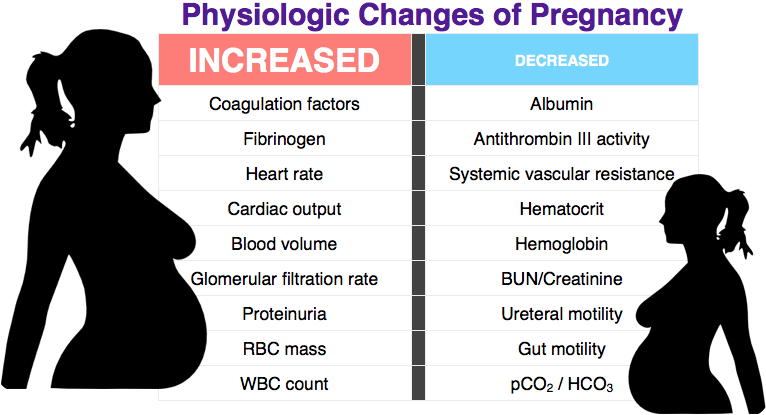 Drinking milk can also help neutralise acid.
Drinking milk can also help neutralise acid.
Is there any medicine I can take?
If your heartburn doesn’t improve by changing how you eat, your doctor or midwife may suggest that you take medicine for it.
Antacids are the first type of medicine to try. They can relieve your symptoms quickly. Antacids are safe in pregnancy as long as you don’t take more than the recommended dose. There are many different types — talk to your pharmacist to find one that’s most suitable for you.
If antacids don’t control your symptoms, speak to your doctor about other medicines you can take.
When should I see a doctor?
If your heartburn symptoms don't go away with medicine, it's important to see your doctor. A serious pregnancy condition called pre-eclampsia can cause pain under your ribs and a feeling of heartburn.
You should also see your doctor immediately if:
- you are vomiting up blood
- you are losing weight
- swallowing is painful or difficult
CHECK YOUR SYMPTOMS — Use the Symptom Checker and find out if you need to seek medical help.
FIND A HEALTH SERVICE — The Service Finder can help you find doctors, pharmacies, hospitals and other health services.
Speak to a maternal child health nurse
Call Pregnancy, Birth and Baby to speak to a maternal child health nurse on 1800 882 436 or video call. Available 7am to midnight (AET), 7 days a week.
Sources:
Australian Government Department of Health and Aged Care (Pregnancy care guidelines – reflux (heartburn)), NSW Health (Heartburn in pregnancy and breastfeeding), NSW Government (Having a baby), King Edward Memorial Hospital (Minor symptoms or disorders in pregnancy), Mater Mothers (Managing pregnancy discomforts), Pharmaceutical Society of Australia (Heartburn and indigestion), MSD Manual (Dyspepsia), RANZCOG (Pre-eclampsia and high blood pressure during pregnancy)Learn more here about the development and quality assurance of healthdirect content.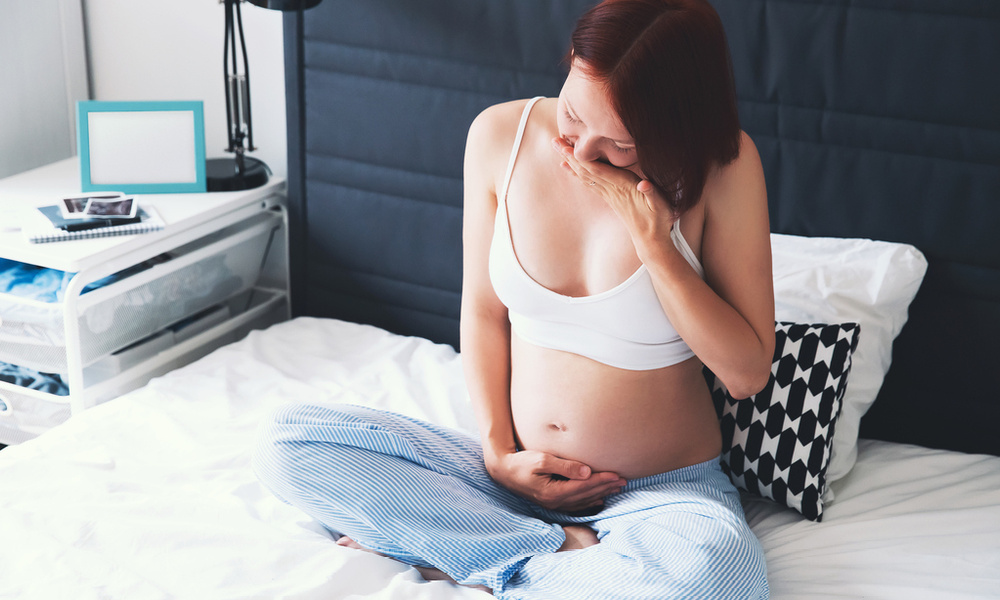
Last reviewed: September 2022
Back To Top
Related pages
- Pre-eclampsia
- Common discomforts during pregnancy
Need more information?
Heartburn in pregnancy | Parenthub
Pregnancy might be a beautiful miracle but it can also be an uncomfortable one, especially when you are experiencing the worst heartburn of your life. And though we may not be able to help you with arguments over baby names or even 'cankles', we can help you with ins and outs of heartburn ... pun intended.
Read more on Parenthub website
Heartburn in Pregnancy | HealthEngine Blog
Heartburn is a symptom commonly experienced by pregnant women such that some women and obstetricians even consider it to be a normal occurrence in a healthy pregnancy.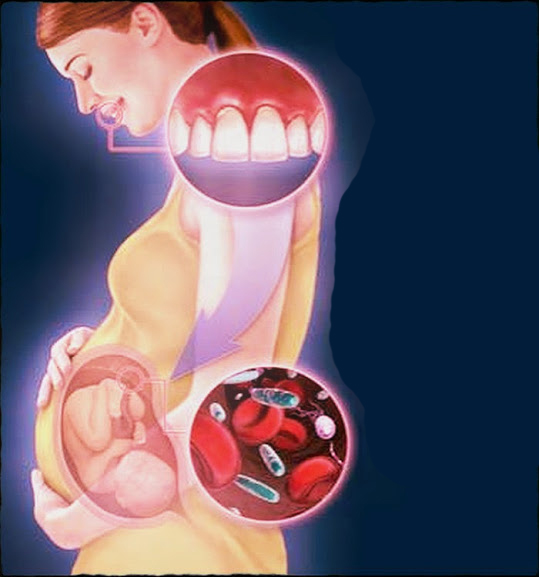
Read more on HealthEngine website
5 weeks pregnant: Changes for mum
Week 5 of pregnancy is probably when you’ll know that you’re pregnant because your period is missing. There are also subtle changes in your body which are symptoms of pregnancy such as changes to your breasts, and pregnancy symptoms like morning sickness and pregnancy heartburn. These changes are caused by pregnancy hormones, like hCG (human chorionic gonadotropin, produced by the placenta) which is the hormone detected by a pregnancy test.
Read more on Parenthub website
Pregnancy at week 28
You are now in the third trimester and you'll probably be feeling many of the common discomforts of pregnancy, like a sore back, swelling, heartburn or cramps.
Read more on Pregnancy, Birth & Baby website
Pregnancy at week 21
At week 21, you should consider whether to do any travel since you may not be able to for much longer in your pregnancy.
Read more on Pregnancy, Birth & Baby website
Pregnancy at week 13
At week 13 of pregnancy, you officially enter your second trimester and hopefully any morning sickness has eased off.
Read more on Pregnancy, Birth & Baby website
Pregnancy nausea and morning sickness remedies
Nausea and vomiting in pregnancy are common and affect women differently. Dr Joe discusses the causes and morning sickness remedies in this video.
Read more on Parenthub website
Pregnancy at week 25
As you are approaching the end of the second trimester, you might be starting to feel a bit uncomfortable as your baby continues to grow.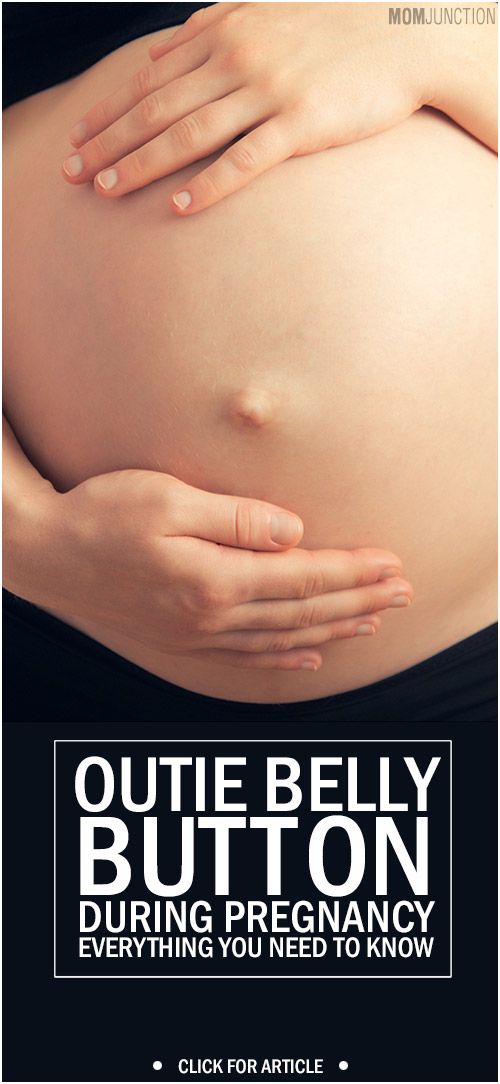
Read more on Pregnancy, Birth & Baby website
Pre-eclampsia and High Blood Pressure During Pregnancy
During pregnancy, very high blood pressure (severe hypertension) can cause complications for both you and your baby
Read more on RANZCOG - Royal Australian and New Zealand College of Obstetricians and Gynaecologists website
Pregnancy - signs and symptoms - Better Health Channel
All women experience pregnancy differently, and you will experience different symptoms at different stages of your pregnancy.
Read more on Better Health Channel website
Disclaimer
Pregnancy, Birth and Baby is not responsible for the content and advertising on the external website you are now entering.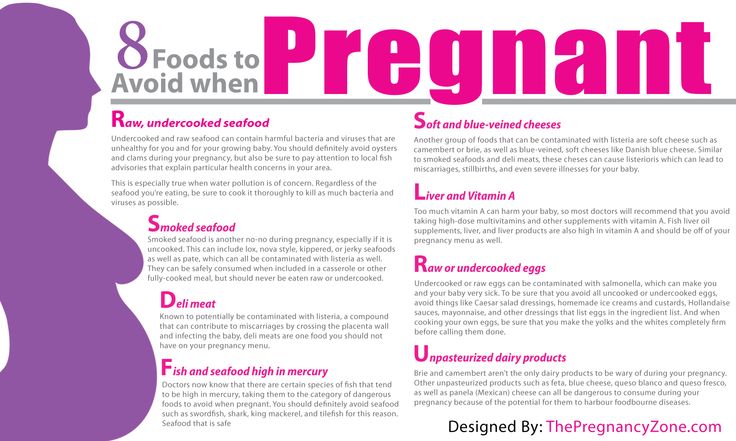
Need further advice or guidance from our maternal child health nurses?
1800 882 436
Video call
- Contact us
- About us
- A-Z topics
- Symptom Checker
- Service Finder
- Linking to us
- Information partners
- Terms of use
- Privacy
Pregnancy, Birth and Baby is funded by the Australian Government and operated by Healthdirect Australia.
Pregnancy, Birth and Baby is provided on behalf of the Department of Health
Pregnancy, Birth and Baby’s information and advice are developed and managed within a rigorous clinical governance framework. This website is certified by the Health On The Net (HON) foundation, the standard for trustworthy health information.
This site is protected by reCAPTCHA and the Google Privacy Policy and Terms of Service apply.
This information is for your general information and use only and is not intended to be used as medical advice and should not be used to diagnose, treat, cure or prevent any medical condition, nor should it be used for therapeutic purposes.
The information is not a substitute for independent professional advice and should not be used as an alternative to professional health care. If you have a particular medical problem, please consult a healthcare professional.
Except as permitted under the Copyright Act 1968, this publication or any part of it may not be reproduced, altered, adapted, stored and/or distributed in any form or by any means without the prior written permission of Healthdirect Australia.
Support this browser is being discontinued for Pregnancy, Birth and Baby
Support for this browser is being discontinued for this site
- Internet Explorer 11 and lower
We currently support Microsoft Edge, Chrome, Firefox and Safari.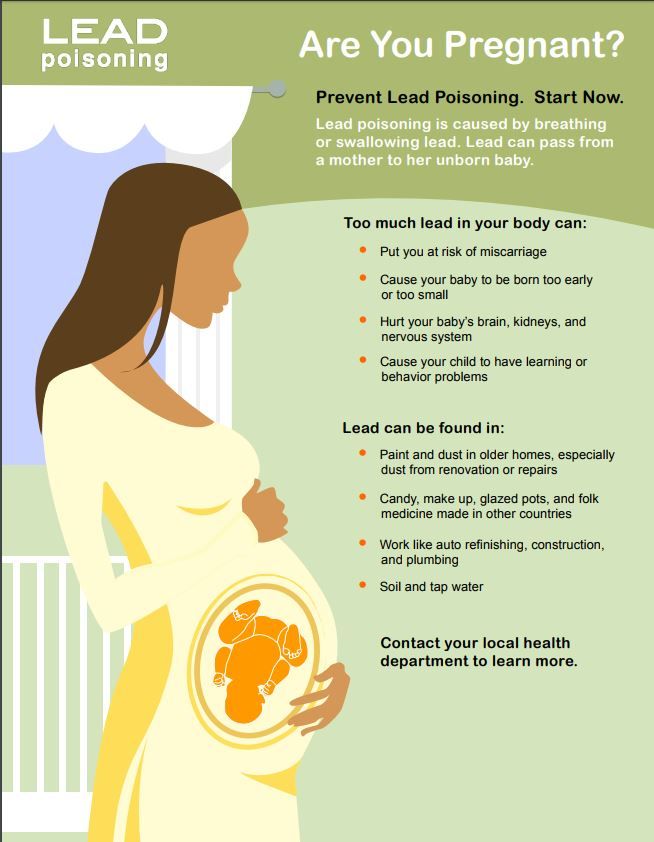 For more information, please visit the links below:
For more information, please visit the links below:
- Chrome by Google
- Firefox by Mozilla
- Microsoft Edge
- Safari by Apple
You are welcome to continue browsing this site with this browser. Some features, tools or interaction may not work correctly.
Indigestion, constipation, flatulence, heartburn
During the period of gestation, the vast majority of expectant mothers are faced with violations of the digestive organs. This is explained by the fact that during pregnancy all the forces of the body are aimed at maintaining the fetus, and the body itself is experiencing serious overload. Therefore, the work of the stomach can be disturbed. During pregnancy, in no case should you neglect your ailments and you should visit the consultations of a gastroenterologist in a timely manner. nine0003
Causes of indigestion
Indigestion and discomfort can develop under the influence of various factors.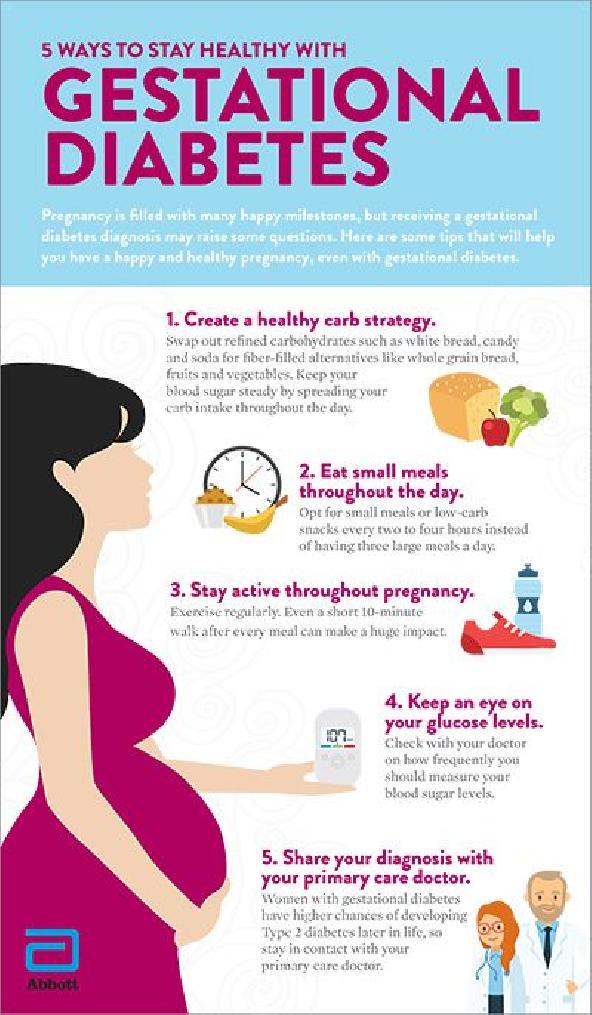 But usually they overtake as a result of an illiterate diet, diet, an increase in acidity, the development of pathogenic microflora or an exacerbation of chronic ailments.
But usually they overtake as a result of an illiterate diet, diet, an increase in acidity, the development of pathogenic microflora or an exacerbation of chronic ailments.
The expectant mother must understand that if she feels bad, then the fetus will definitely suffer. Malfunctions in digestion can provoke abnormal or inhibited development, premature birth, spontaneous abortion. If you experience frequent belching, sour taste, heartburn, or signs of poor stomach function, you should immediately visit a doctor. The examination will provide an opportunity to find the cause of the ailments. The doctor will prescribe drugs that are harmless to the fetus, which will help alleviate the condition of the mother. nine0003
Heartburn in pregnancy
Heartburn is one of the most common disorders of the stomach during pregnancy. It manifests itself in a burning sensation in the stomach. Heartburn develops with an increase in acidity, as well as splashing out the contents of the stomach into the esophagus. The inner lining of the esophagus is irritated and the woman experiences discomfort. Heartburn should not be considered a disease - it is just a sign of some disorder in the body. Eight out of ten pregnant women experience this unpleasant phenomenon. nine0003
The inner lining of the esophagus is irritated and the woman experiences discomfort. Heartburn should not be considered a disease - it is just a sign of some disorder in the body. Eight out of ten pregnant women experience this unpleasant phenomenon. nine0003
Causes of heartburn
The reason for this, in the first place, is the relaxation of the abdominal muscles, which is provided by a high level of progesterone. The volume of the uterus does not allow the valve to close completely, which protects the esophagus from spilling semi-digested food masses into it. In addition, most expectant mothers constantly "allow themselves too much", overeating, eating foods that increase acid production.
It is interesting that the appearance of heartburn during pregnancy is usually combined with a deterioration in the emotional state, belching, pain behind the sternum. In addition, this phenomenon can cause other ailments of the gastrointestinal tract. Therefore, if heartburn occurs, you should consult a doctor.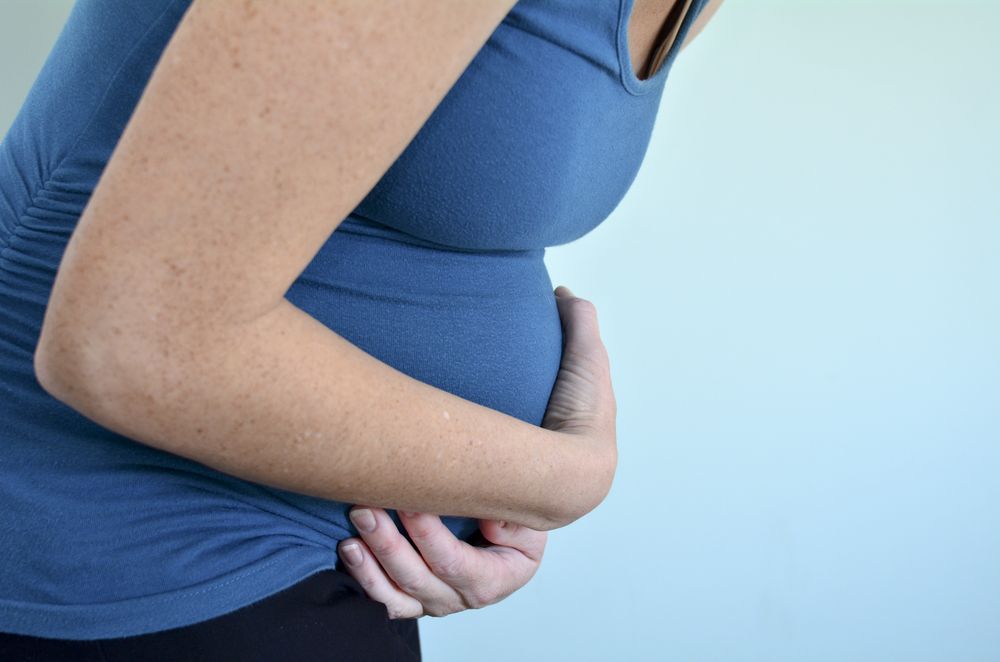 This will help prevent possible complications. nine0003
This will help prevent possible complications. nine0003
Indigestion during pregnancy is usually due to the lack of a meal schedule, as well as the use of inappropriate foods. If digestion is disordered, the whole organism suffers. If abdominal pain, diarrhea and heartburn are the result of a single food poisoning, then they are not dangerous for the course of pregnancy. However, if these unpleasant phenomena are frequent, you should definitely visit a doctor. Indeed, with improper digestion, the body does not receive enough calories, proteins, fats, vitamins and carbohydrates, that is, it experiences a kind of starvation, and the body of the unborn child suffers along with the mother's body. nine0003
Prevention
To be honest, no tricks will help one hundred percent prevent heartburn, as well as other minor digestive disorders. They are an unpleasant addition to the joys of motherhood. But you can try to reduce their manifestations. For this:
- try not to overeat,
- eat more often, but reduce the single portion,
- grind food very well in your mouth,
- choose a comfortable wardrobe so that the stomach is not squeezed by rubber bands, belts or tight belts,
- try not to smoke, fast food, fried foods, alcohol, coffee;
Flatulence
Flatulence is called an excessive accumulation of gases in the intestines. This problem occurs in almost all women during pregnancy. Flatulence in pregnant women is an urgent issue due to the fact that it causes a lot of trouble and embarrassing moments for a woman who is expecting a baby. As a result of bloating, there is a feeling of fullness, rumbling and belching. nine0003
This problem occurs in almost all women during pregnancy. Flatulence in pregnant women is an urgent issue due to the fact that it causes a lot of trouble and embarrassing moments for a woman who is expecting a baby. As a result of bloating, there is a feeling of fullness, rumbling and belching. nine0003
Causes of flatulence
The causes of flatulence in pregnant women are varied. There are specific factors for its appearance that occur during pregnancy. These include a change in the hormonal status in a woman's body and a change in the position of the internal organs of the abdominal cavity.
So, from the moment of fertilization (conception) in the body, the production of the pregnancy hormone (progesterone) increases, which helps to relax the muscles of the uterus. But, unfortunately, its action is not selective: under the influence of progesterone, the muscles of the stomach and intestines also relax. This contributes to the violation of intestinal motility (wave-like movement of the intestinal walls). As a result, there is a delay in bowel emptying and an increase in fermentation processes, which leads to increased gas formation and the development of flatulence. nine0003
As a result, there is a delay in bowel emptying and an increase in fermentation processes, which leads to increased gas formation and the development of flatulence. nine0003
In the second and third trimester, the development of flatulence in pregnant women is additionally promoted by an enlarged uterus. It compresses the intestines and exacerbates the problems described above, which usually already exist by this time.
Of course, it is impossible not to note the effect of factors not related to pregnancy. These include functional bowel disorders (dyspepsia and irritable bowel syndrome), as well as organic diseases of the digestive system (gastritis, chronic colitis). nine0003
Symptoms
The main symptom of flatulence is bloating and pain in the abdomen. The pain is often cramping, it disappears after the discharge of gases, which occurs frequently during flatulence, more than 20 times a day. Flatulence in pregnant women may be accompanied by belching, hiccups, headaches, bad breath.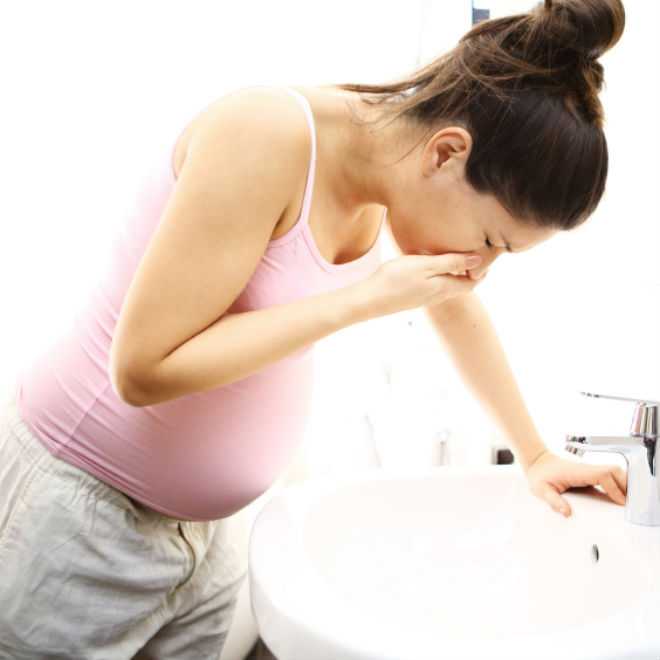 This condition is dangerous because it can provoke an increase in the tone of the uterus and stimulate its contractions, which in turn can lead to the development of a threat of miscarriage. nine0003
This condition is dangerous because it can provoke an increase in the tone of the uterus and stimulate its contractions, which in turn can lead to the development of a threat of miscarriage. nine0003
Treatment and prevention
Following a few simple rules for eating will help reduce the risk of flatulence during pregnancy. In no case should you eat while standing or on the move, hastily eating, as in this case the swallowing of air increases, which creates an "air pocket" in the intestines, and is accompanied by characteristic pain.
It is necessary to exclude foods that cause flatulence, because the most affordable, simple and safe method of dealing with flatulence for a pregnant woman is to adjust the diet. From the diet, you need to remove foods that contribute to increased gas formation in the intestines (legumes, black bread, raw vegetables and fruits, whole milk, sweet, fried, spicy). It is recommended to use lactic acid products, stewed or baked vegetables.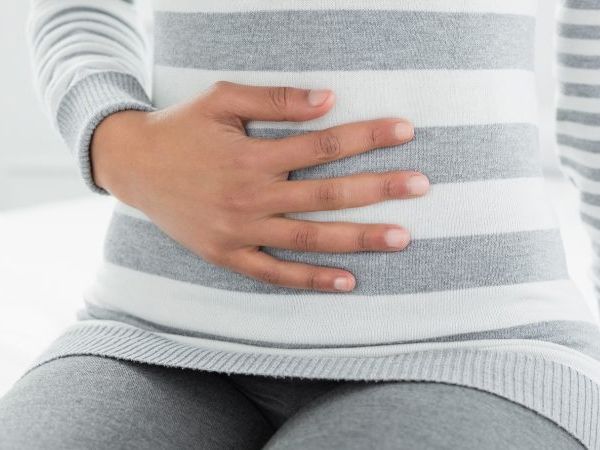 nine0003
nine0003
Physical activity stimulates the intestines well: daily walks lasting at least 1 hour will help in the fight against flatulence. You can do self-massage of the abdomen - light strokes clockwise. Decoctions (teas) of medicinal herbs are also popular: chamomile, dill, mint, lemon balm and others.
But, unfortunately, with severe flatulence and in the presence of concomitant pathologies, it is often necessary to resort to the help of drugs.
Constipation in pregnancy
Among the typical problems that pregnant women face is difficulty with bowel movements (in other words, constipation). Two-thirds of women complain of constipation during pregnancy and one in three after childbirth.
Causes:
- During pregnancy, especially in the second half, the intestines are compressed by the enlarging uterus. This leads to a violation of the outflow of blood and the occurrence of venous stasis in the vessels of the small pelvis.
 As a result, hemorrhoids can develop - an expansion of the veins of the rectum and, as a result, constipation. nine0037
As a result, hemorrhoids can develop - an expansion of the veins of the rectum and, as a result, constipation. nine0037 - The human body produces special substances that stimulate intestinal contractions. During pregnancy, the susceptibility of the intestinal musculature to such stimulants is significantly reduced. Nature disposed very reasonably - after all, the intestines and the uterus have a common innervation, so any excessive activation of intestinal motility can stimulate the contractile activity of the uterus, causing a threat of abortion. Unfortunately, this positive defensive reaction also has undesirable consequences - constipation. nine0037
- The development of constipation is facilitated by hormonal changes that occur in pregnant women. In particular, the digestive process slows down under the influence of the pregnancy hormone, progesterone.
- It is no secret that pregnant women are often emotionally unstable, stressed, and suffer from unfounded fears. Modern medicine has come to the conclusion that constipation in general and - in particular - constipation in pregnant women are often caused by stress and other psychological factors.
 In the postpartum period, women are less likely to suffer from constipation - perhaps because their psycho-emotional state after childbirth improves quickly and significantly. nine0037
In the postpartum period, women are less likely to suffer from constipation - perhaps because their psycho-emotional state after childbirth improves quickly and significantly. nine0037 - Allergic and autoimmune processes also play a certain role in the development of constipation.
Symptoms
Constipation is the absence of a bowel movement for three days or more. In pregnant women, constipation may be accompanied by a feeling of incomplete release, pain in the abdomen (often in the left half). With hemorrhoids, streaks of blood may be present in the stool. Some women, along with abdominal pain, feel a burning sensation in the rectum and itching in the anus. With constipation, nausea, bitterness in the mouth, bloating, rumbling in the stomach can also disturb. nine0003
Treatment
Diet helps to cope with constipation. The intestines should receive as much fiber as possible. It is not digested, but only swells, increasing the volume of feces and promoting bowel movements. Therefore, carrots, cucumbers, tomatoes, beets, zucchini, pumpkin, apples, as well as wholemeal bread and dried fruits should be included in the diet. Often, fermented milk products give a good laxative effect: kefir, curdled milk, as well as kvass, sour cabbage soup. Vegetable fats are useful: when split, they form fatty acids that stimulate peristalsis. nine0003
Therefore, carrots, cucumbers, tomatoes, beets, zucchini, pumpkin, apples, as well as wholemeal bread and dried fruits should be included in the diet. Often, fermented milk products give a good laxative effect: kefir, curdled milk, as well as kvass, sour cabbage soup. Vegetable fats are useful: when split, they form fatty acids that stimulate peristalsis. nine0003
Prunes are best used as an infusion: pour 100 g of fruits with two cups of boiling water, add a little sugar, cover with a lid and leave for 10-12 hours. It is better to do it in the evening. The next day, they drink half a glass of infusion before meals, and eat plums. Another remedy for constipation is to drink a glass of cold water on an empty stomach. You can add a spoonful of honey to it.
You should not get carried away with strong tea, black coffee, cocoa, chocolate, white bread, flour and slimy soups, semolina, blueberries. All these products, as well as dry food, have a fixing effect. nine0003
With severe bloating, it is allowed to take infusions of chamomile flowers, mint leaves, caraway seeds, dill, and carbolen (activated charcoal). But only in the amounts recommended by the doctor.
But only in the amounts recommended by the doctor.
You should also try not to stand for a long time, not to lift weights, to do gymnastics to strengthen the muscles of the pelvic floor. By the way, exercise will help increase intestinal motility.
How not to treat constipation during pregnancy? nine0006
Physiotherapeutic methods of treatment (novocaine electrophoresis, inductothermy, electrical stimulation, diadynamic currents, sinusoidal modulated currents), often used for constipation, are contraindicated for pregnant women: there is a great danger of stimulating the contractile activity of the uterus, sensitizing the body (i.e. increasing its sensitivity to various stimuli), adverse effects on the fetus.
It is undesirable to take laxatives because of the possible termination of pregnancy. This applies not only to such potent drugs as magnesium sulfate, Karlovy Vary salt, castor oil, but also to weaker ones - buckthorn bark, rhubarb, joster fruits, senna leaves. Cafeol, besacodyl drugs cause cramping pain in the abdomen, frequent loose stools. Therefore, it is better to avoid laxatives, limiting yourself to foods rich in fiber. nine0003
Cafeol, besacodyl drugs cause cramping pain in the abdomen, frequent loose stools. Therefore, it is better to avoid laxatives, limiting yourself to foods rich in fiber. nine0003
OSTEOPATHICS AND DIGESTIVE DISORDERS
The following facts will help you understand the use of osteopathy as a remedy for the above problems during pregnancy. Osteopathic treatment is carried out only in cases where the presence of other serious diseases is excluded. The lower part of the intestine receives signals through the nerves from the lower segments of the spinal cord. Signaling can be affected by deformities and problems in the lumbar spine. Thus, a problem with the disc can lead to a complete cessation of bowel movement, paralysis of the legs, as well as urinary retention. In the event of a violation in the mechanics of the spine, intestinal mobility may be impaired. However, it does not cause serious complications associated with nervous activity. Such disorders can lead to degradation of the joints and discs, stiffness in the spine and pelvic region, severe tension in the joints, accompanied by swelling. Osteopathic treatment is suitable for correcting the above conditions. nine0014
Osteopathic treatment is suitable for correcting the above conditions. nine0014
Osteopathy seeks to reduce tension in the pelvis and lower spine. The goal of treatment is not only to relieve bone and muscle pain, but also to improve bowel movement. The treatment theory also advocates meeting the need for exercise for all those who suffer from problems related to the mechanics of the pelvis and lumbar.
For the treatment of some forms of constipation, direct action on the intestines can be used. Osteopathic techniques are commonly applied to the hepatic flexure, sigmoid colon, splenic flexure of the colon, and iliocecal valve. nine0003
toxemia, bowel problems and heartburn
Find out how pregnancy affects the digestive tract, which trimesters are more likely to cause symptoms of indigestion and nausea, and what to do to manage them.
During pregnancy, the burden on the mother's body increases. The body needs more nutrients, the body produces additional hormones.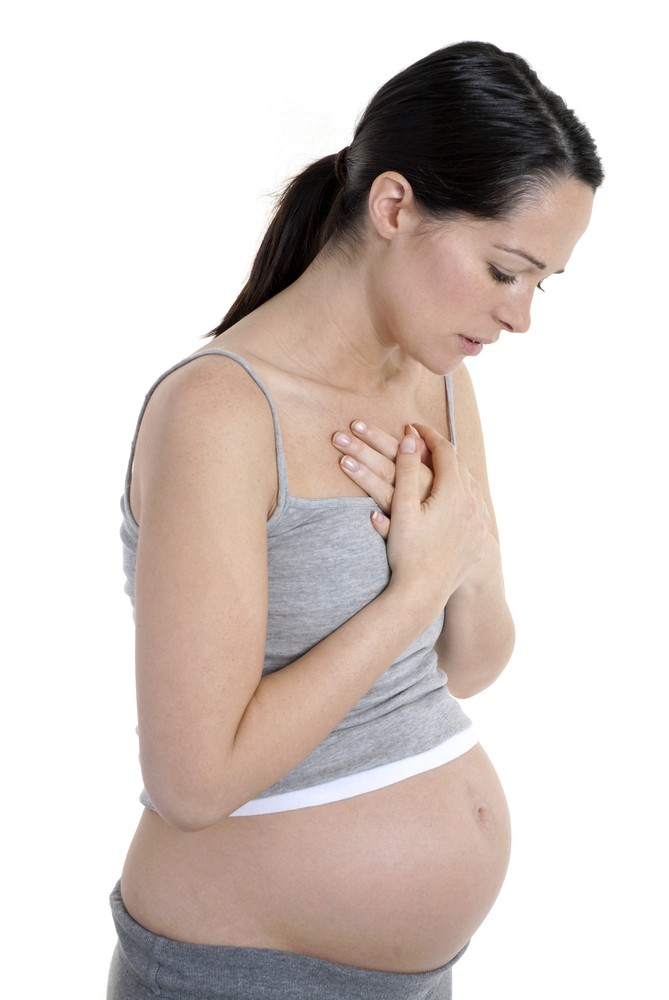 And the growing fetus puts pressure on neighboring organs, including the stomach and intestines. We tell you what symptoms are observed in each trimester, how to cope with toxicosis and get rid of heartburn. nine0003
And the growing fetus puts pressure on neighboring organs, including the stomach and intestines. We tell you what symptoms are observed in each trimester, how to cope with toxicosis and get rid of heartburn. nine0003
Contents:
- 2. Toxicosis and pregnancy
- 3. Causes, risks and treatment of diarrhea during pregnancy
- 4. Heartburn and stomach pain during pregnancy
- 5. Bloating, constipation and microbiota during pregnancy
- 6. Note
Changes in the work of the gastrointestinal tract by trimesters of pregnancy
The average duration of pregnancy is 40 weeks, which are usually divided into trimesters in accordance with the stages of intrauterine development of the child. nine0003
Each trimester is accompanied by a number of changes in the body, including in the gastrointestinal tract:
| The first trimester 26 weeks | Third trimester 27-40 weeks |
| Morning sickness Morning sickness |
The Atlas Genetic Test will help you find out how your genes affect the level of female sex hormones necessary for fertility and pregnancy.

Causes of gastrointestinal problems during pregnancy
Every pregnancy is accompanied by inevitable changes in the functioning of the digestive system. They are more often caused by hormonal changes and increased stress on the organs, but they can also be associated with lifestyle and health conditions, for example:
- Sedentary lifestyle and unbalanced diet; nine0037
- Certain drugs, including calcium or aluminum antacids;
- Viral and bacterial infections;
- Intolerance to certain nutrients and allergic reactions;
- Stress;
- Diseases of the thyroid gland.
If you have chronic diseases of the gastrointestinal tract and you are planning a pregnancy, try to consult your doctor in advance. Symptoms of conditions such as irritable bowel syndrome (IBS) or acid reflux are more likely to get worse during pregnancy. Your doctor will help prepare your body and create a prevention plan to help relieve symptoms during this time. nine0003
nine0003
Irritable bowel syndrome, or IBS, is a functional bowel disease that causes frequent abdominal pain, impaired peristalsis, bloating, constipation, or diarrhea.
Morning sickness, vomiting and general malaise during pregnancy
Morning sickness and morning sickness during early pregnancy are common, because the body undergoes important changes necessary for the development of the child.
up to 90%
women experience nausea during pregnancy
Doctors find it difficult to say with certainty why pregnant women feel sick in the morning. The main theory is hormonal changes. But there are some patterns associated with an increased risk of morning sickness:
- Multiple pregnancy;
- Toxicosis during previous pregnancy;
- History of morning sickness during pregnancy in close relatives;
- Tendency to motion sickness in transport;
- Use of oral contraceptives containing estrogen before pregnancy; nine0037
- Frequent migraines;
- BMI 30 and above;
- Elevated levels of stress hormones
Risks of severe morning sickness and how to reduce nausea
Nausea and vomiting are usually not associated with a risk for mother and child and disappear by 16-20 weeks of pregnancy, but it is not necessary to wait so long - there are ways that can help reduce nausea and enjoy the process of waiting for a new person:
- Get plenty of rest - fatigue increases toxicosis; nine0037
- Avoid smells and foods that cause nausea;
- Eat something right after waking up.
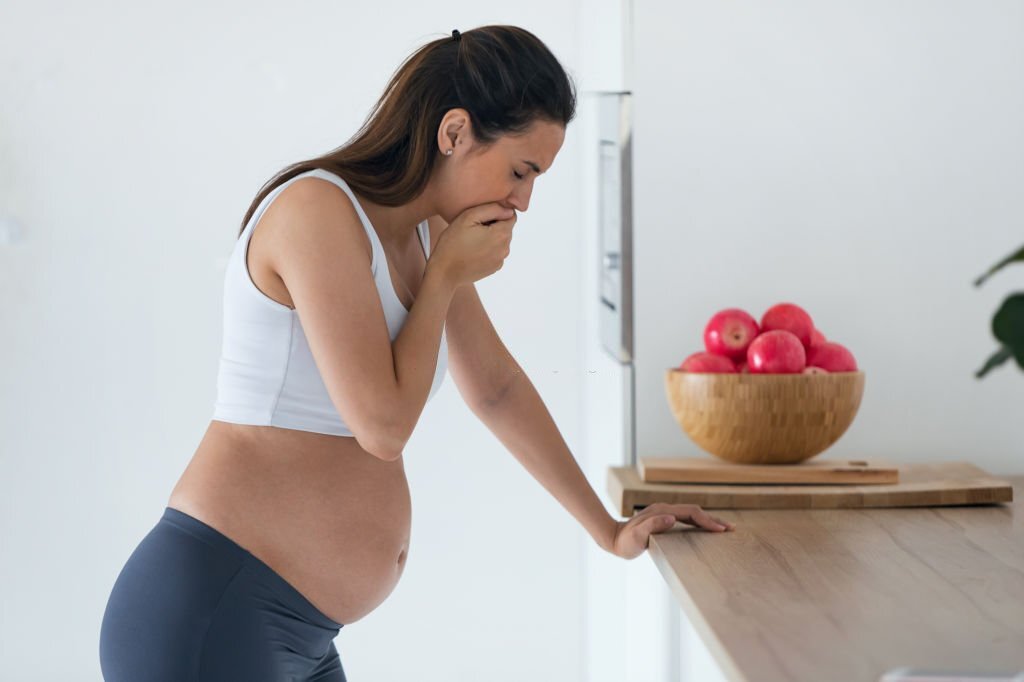 A toast or a slice of bread will help reduce nausea;
A toast or a slice of bread will help reduce nausea; - Avoid hunger - empty stomach increases nausea. Eat small meals often, prefer low-fat, high-carbohydrate foods;
- Try ginger - studies show it helps with nausea;
- Sip as often as possible and prefer still water. nine0037
Rarely, pregnant women may develop hyperemesis gestationis or excessive vomiting. This is a serious condition that can lead to dehydration, kidney damage, seizures, abnormal heart rhythms, and even death.
Signs of dehydration include: dry mouth, dizziness, dark urine, infrequent urination and/or dizziness.
Symptoms of excessive pregnancy vomiting:
- frequent nausea for a long time and regular vomiting after meals;
- dry skin and lips;
- sudden weight loss;
- low blood pressure (below 90/60).
If symptoms of excessive pregnancy vomiting occur, do not wait until the condition resolves on its own. It is necessary to seek medical help as soon as possible - the doctor will prescribe treatment, help adjust the diet and lifestyle of the expectant mother.
It is necessary to seek medical help as soon as possible - the doctor will prescribe treatment, help adjust the diet and lifestyle of the expectant mother.
0.5–2%
pregnant women experience excessive vomiting
Diarrhea in pregnancy
The word "diarrhea" comes from the Greek language and literally means "to flow through". This is a condition during which bowel movements or bowel movements occur three times a day or more often. This phenomenon is especially typical for the third trimester of pregnancy, but it can also occur earlier.
Symptoms of diarrhea:
- Three or more bowel movements per day
- Urgent urge to have a bowel movement
- Abdominal pain and cramps
- Bloating
Causes of diarrhea during pregnancy poisoning, dysbacteriosis, bacterial and viral infections:
| Gastroenteritis | Use of lactose and gluten in case of intolerance to these nutrients |
| Bacterial infections: listeriosis or salmonella | Chronic gastrointestinal diseases: Crohn's disease, IBS, ulcerative colitis |
| Certain antibiotics and antacids to reduce acidity | Laxatives |
| Sugar substitutes such as sorbitol | Overconsumption of certain foods |
Tip: If you have recently returned from a holiday in an exotic country with nausea and diarrhea and find out you are pregnant, see your doctor as soon as possible. nine0276
nine0276
Gastroenteritis
One common cause of diarrhea during pregnancy is gastroenteritis or stomach flu. It is caused by bacterial or viral infections: norovirus, rotavirus, E. coli, salmonella, which enter the body through contact with contaminated surfaces, dishes, food and water.
Gastroenteritis usually lasts about three days. However, severe illness is a health hazard, especially during pregnancy, as it can cause dehydration, electrolyte imbalance, and lead to preterm labor. nine0003
The main symptoms of gastroenteritis are diarrhea without blood, nausea and vomiting, stomach cramps and pain, slight fever, headache and muscle pain.
Take extra precautions to reduce your risk of getting sick: frequent handwashing and surface disinfection. If the expectant mother has small children, they are not recommended to use the same cutlery.
Risks of diarrhea during pregnancy
Usually diarrhea during pregnancy is not a cause for concern.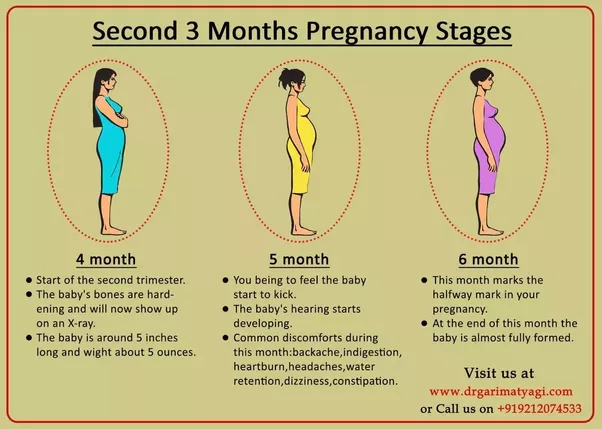 However, you should consult a doctor if the following symptoms occur during this period:
However, you should consult a doctor if the following symptoms occur during this period:
- Diarrhea for more than two days;
- Stools with blood or mucus;
- Sudden weight loss;
- Abdominal pain;
- Dehydration.
How to treat diarrhea during pregnancy
If you have diarrhea during pregnancy, drink plenty of fluids, avoid foods high in fat and sugar, avoid dairy products, and caffeinated drinks.
Dehydration is a serious risk, especially during pregnancy, so electrolyte balance should be restored first with fluids and simple foods:
| Moderate fruit juices | Drinks without alcohol and caffeine |
| Bananas | Potato |
| Rice | Toast |
| Rusks | Light soups and broths |
| Pasta | Applesauce |
Use the Atlas Microbiota Test to find out your body's ability to break down lactose and gluten. nine0276
nine0276
Stomach pain and heartburn during pregnancy
Many women experience stomach pain during pregnancy, especially the upper part of the stomach, as well as heartburn - a burning sensation in the chest and esophagus.
This is more common in the third trimester, after about 27 weeks. This is an unpleasant but natural phenomenon during pregnancy: the baby grows inside the uterus and presses on other organs, including the stomach. And hormones cause the muscles to relax, which causes acid from the stomach to enter the esophagus and irritate it. In addition, pain can be caused by problems with certain organs such as the gallbladder, or inflammation of the pancreas. nine0003
Symptoms of heartburn during pregnancy:
- Burning in chest and esophagus;
- Feeling of overeating, heaviness or bloating;
- Belching, including with acid and/or food particles;
- Nausea.
Avoid cramps and heartburn during pregnancy is unlikely.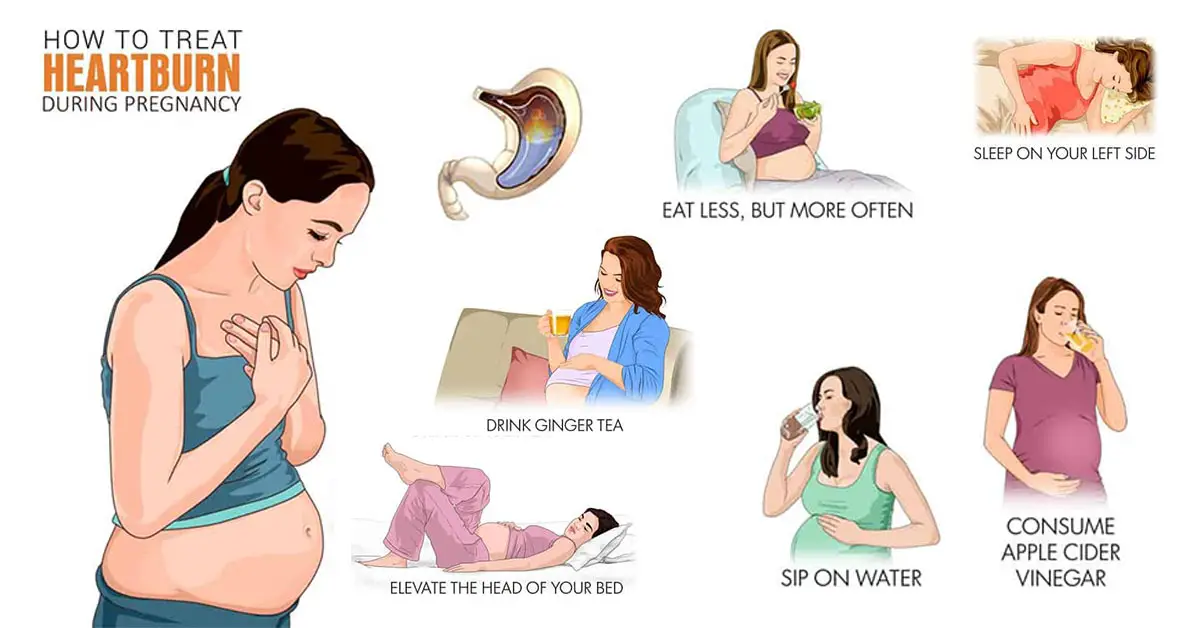 However, some tips can help reduce their frequency:
However, some tips can help reduce their frequency:
Nutrition : try to avoid overeating - eat easily digestible food in small portions; do not eat three hours before bedtime; watch your posture while eating - so the pressure on your stomach will be less. nine0003
Smoking and alcohol: In addition to known harms to mothers and babies, tobacco smoke also relaxes the muscles in the lower esophagus, allowing acid to enter the esophagus. And alcohol provokes heartburn and acid reflux.
Although stomach pain and heartburn often accompany pregnancy, abdominal pain, especially in the third trimester, should be taken seriously. It can be a sign of preterm labor or placental abruption, and puts mother and baby at risk. nine0003
If you experience severe abdominal pain during pregnancy that is accompanied by the following symptoms, seek medical attention as soon as possible:
| Abdominal pain and fever | Bleeding |
| Regular seizures | Unusual vaginal discharge / spotting |
| Vomiting | Low back pain |
| Pain or burning when urinating | Severe pain that lasts 30-60 minutes |
Bloating, constipation and microbiota during pregnancy
Excessive gas and constipation during pregnancy can be caused by hormonal changes, such as increased production of progesterone. This hormone, essential for nourishing the uterus and fetus, relaxes the muscles of the body, including the muscles in the intestines, which slows down digestion and increases flatulence. A similar reaction of the body can be observed before each menstruation, when the production of progesterone increases. nine0003
This hormone, essential for nourishing the uterus and fetus, relaxes the muscles of the body, including the muscles in the intestines, which slows down digestion and increases flatulence. A similar reaction of the body can be observed before each menstruation, when the production of progesterone increases. nine0003
Flatulence - bloating of the abdomen due to the accumulation of gases.
Here are a few simple rules that will help improve intestinal motility and avoid constipation and bloating:
- If you do not usually eat a lot of fiber and indigestible foods like legumes, try to gradually introduce them into the diet;
- Avoid carbonated drinks and fatty foods;
- Move more;
- Drink plenty of fluids.
If bloating and constipation are accompanied by severe pain that lasts more than 30 minutes, or if you have been constipated for two or more weeks, see your doctor. nine0003
Gut microbiota and bacteria during pregnancy
A woman's body goes through many changes during pregnancy, and this can affect the microbiota, the bacterial ecosystem that lives in the gut. Trillions of microorganisms do important work for the whole body: they synthesize vitamins and essential acids, keep your intestines working and protect it from disease and inflammation.
Trillions of microorganisms do important work for the whole body: they synthesize vitamins and essential acids, keep your intestines working and protect it from disease and inflammation.
The additional influx of female hormones that accompanies pregnancy alters gut function and affects the microbiota. This is good, because the bacterial community is constantly adjusting to external and internal conditions in order to keep up with the needs of the body. nine0003
To keep your gut bacteria running smoothly, they need your help. Provide them with healthy foods and plant fibers. Fruits, vegetables, whole grains, nuts, and seeds contain prebiotics, special substances that beneficial bacteria feed on. When properly balanced, the bacteria even increase your body's defenses against harmful microorganisms that can cause gastroenteritis during pregnancy.
The Atlas Microbiota Test will help you understand how to prepare your intestines for a future pregnancy and reduce the risk of digestive problems. nine0276
nine0276
☝️ Take note
Now you have all the necessary knowledge and tools to help you deal with digestive problems during pregnancy. They are quite varied and quite natural, but in some cases it is necessary to immediately seek medical help:
- Vomiting blood;
- Blood in stool;
- Diarrhea for more than two days;
- Constipation for more than two weeks;
- Sudden weight loss;
- Severe pain interfering with daily activities; nine0037
- Difficulty breathing;
- Pain when swallowing or difficulty swallowing;
- Excessive fatigue.
More articles on the causes of digestive problems on the blog:
- 7 foods that cause gas and bloating
- Lindsey J Wegrzyniak, Treatment of Hyperemesis Gravidarum, 2012 nine0036 Edwards A. et al., The Maternal Gut Microbiome During Pregnancy, 2018
- National Health and Safety (NHS), Vomiting and morning sickness in pregnancy
- Kudzai Kanhutu, Travel and pregnancy: an infectious diseases perspective, 2011
- CDC, Pregnant travelers
- U.
